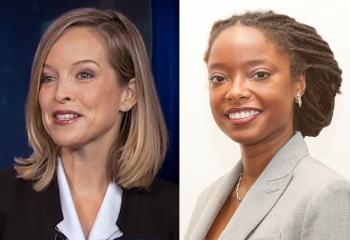Written by Adam Gabriele, Arizona State University. Originally published on ASUNow.
There’s an exciting change under way in the scientific community. Citizens with an avid interest in science are getting the chance to contribute to real research through data collection and analysis in collaboration with professional scientists.

These “citizen scientists” — tinkerers and enthusiasts of all stripes — are being given the tools and platforms to turn their interests into real research, perhaps minimizing or even bringing to an end the stark division between academia and society.Darlene Cavalier and Kiki Jenkins, professors from the School for the Future of Innovation in Society.Download Full Image
In 2016, ASU hosted the Citizen Science Maker Summit, organized by Darlene Cavalier, professor of practice with ASU’s School for the Future of Innovation in Society (SFIS).
Diving in and developing creative solutions is a characteristic that “mirrors that of the millions of citizen scientists around the world who are contributing to our understanding of the world and how we can solve today’s problems,” Cavalier said.
ASU isn’t the only institution that’s caught on to the increasing relevance of citizen science.
The National Academy of Sciences has formed the Committee on Designing Citizen Science to Support Science Learning to identify and describe existing citizen science projects that support science learning in both formal and informal settings. The committee will develop a set of evidence-based principles to guide the design of citizen science.
Cavalier, founder of SciStarter — an online platform for identifying, supporting, and participating in citizen science opportunities, was invited to be a member of the committee.
“I’m thrilled to have an opportunity to work with the committee to address an important gap in citizen science literature: understanding how to design citizen science so it can better support deeper forms of science learning,” she said.
The committee plans to evaluate the potential of citizen science to support science learning, lay out a research agenda to improve that potential, and identify promising practices and programs.
Cavalier is also the co-founder of the Expert and Citizen Assessment of Science and Technology (ECAST) network, co-editor of The Rightful Place of Science: Citizen Science, and a member of the Environmental Protection Agency’s National Advisory Council for Environmental Policy and Technology.
Lekelia “Kiki” Jenkins, assistant professor at the School for the Future of Innovation in Society, has also been named a founding member of the committee.
Jenkins is an award-winning marine conservation scientist who has published extensively on adult science learning in fishery learning exchanges. She is a Ford Foundation Fellow, a David H. Smith Conservation Research Fellow, and an Alfred P. Sloan Research Fellow.
“I’m honored to be selected to serve on the National Academies of Science Committee on Designing Citizen Science to Support Science Learning,” Jenkins said. “Serving on an NAS committee helps fulfil one of my career aspirations.”
Jenkins has already begun to implement a process for creating a consensus definition of citizen science, which, she said, “is a critical first step in the committee’s work.”

